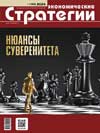Global Reset of Russia’s Sociocultural Trend: from “Classical” to “New” Eurasianism. Part II
DOI: 10.33917/es-2.194.2024.96-107
The article identifies dynamics of the Eurasian concept, which is considered as the basic strategy for the positive development of Russia’s foreseeable future. The author shows that over the last century the national Eurasian model has been transformed in the process of actual socio-economic and political-ideological attitudes. Within classical eurasianism Russia is viewed as a special geographical and socio-cultural civilization that combines Western (Western European) and Eastern (Asian) stereotypes.
It is proved that in the process of the USSR development and formation of the “new” Russia, the theory of eurasianism with a Western European trend was being implemented. Since the second decade of the 21st century, in order to overcome the consequences of anti-Russian sanctions, the Russian Federation has been stimulating a national strategy of Eurasianism with an Eastern (Asian) orientation. However, by the middle of the 21st century in implementing the conceptual model of Eurasianism Russia will return, as suggested in the article, to a classical strategy based on a balance of Westernization and Orientalist ideas.
References:
10. Gumilev L.N. Zametki poslednego evraziytsa [Notes from the Last Eurasian]. Nashe nasledie,1991, no 3, pp. 19–26.
11. Gumilev L.N. “Menya nazyvayut evraziytsem…” [“They Call me a Eurasian…”]. Nash sovremennik, 1991, no 1, pp. 62–70.
12. Likhachev D.S. O natsional’nom kharaktere russkikh [On the National Character of Russians]. Voprosy filosofii, 1990, no 4, pp. 3–6.
13. Polynov M.F. Gonka vooruzheniy kak metod izmatyvaniya SSSR SShA. 1945–1990 gg. [The Arms Race as a Method of Exhausting the USSR and the USA. 1945–1990]. Vestnik Sankt-Peterburgskogo universiteta, 2005, Seriya 2, no 3, pp. 92–103.
14. L’vov D.S. Ekonomika razvitiya [Economics of Development]. Moscow, Ekzamen, 2002.
15. Prokhanov A.A., Glaz’ev S.Yu. Kholodnaya voyna 2.0. Strategiya russkoy pobedy [Cold War 2.0. Russian victory strategy]. Moscow, Knizhnyy mir, 2015, 384 p.
16. Maslov A. Kitayskiy vektor Rossii [Chinese Vector of Russia]. Kommersant”, 2022, 4 fevralya, no 20.
17. Dugin A. My voyuem s tsivilizatsiey Antikhrista [We are at War with the Civilization of the Antichrist]. Izborskiy klub, 2022, 4 maya.
18. Gumilev L.N. Skazhu Vam po sekretu, chto, esli Rossiya budet spasena, tol’ko cherez evraziystvo [I’ll tell you a Secret that if Russia is Saved, it will only be Through Eurasianism]. Sotsium,1992, no 9, p. 89.





